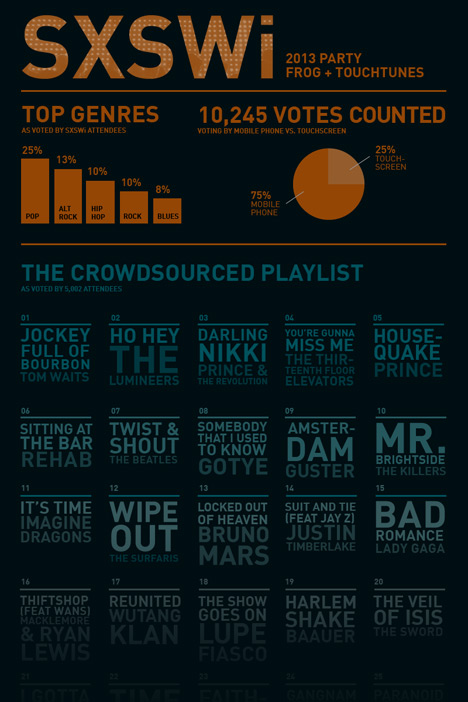
A research report on the dynamics of crowd-sourcing music at the frog SXSW Interactive Opening Party, by Bonnie Reese, Mike Herdzina and Shaina Donovan—see Parts 1&2 for more information.
Crowdsourcing Gives Everyone a Voice
The overall response to the Crowd Sourced DJ was overwhelmingly positive. It was described as "novel" and people loved that it allowed them to participate in the music selection. When we probed further about what made it attractive, party-goers were enthusiastic about the philosophy of crowdsourcing, noting that it is a vehicle that gives everyone a voice. We were struck by the passionate tone and language of the participants. Some of the comments included:
- "It's for the community by the community,"
- "It's democratic,"
- "You have a chance to have a say"
However, while people embraced the spirit of crowdsourcing, many openly acknowledged that it compromised the quality of the output. We heard comments like:
- "The masses have bad taste"
- "I don't trust the public"
And yet those interviewed did not perceive the conflict between crowd selections and individual taste as an inherent negative. One music-savvy partygoer intimated that while the music being played did not align with his preferences, it still "fell within his range of acceptability." In the context of a large social experience, like a party, the spirit of empowering the crowd reigns supreme. Many people acknowledged the party context and noted that there's a time and place for everything. So while crowdsourcing is okay in one moment and social environment, it may not be appropriate for every situation.
Crowdsourcing Makes Everyone Think Like a DJ
So what were the biggest influencers when individuals had to make a music selection? First of all, people took into account the audience for the music as well as the party context. "Party music" was referenced almost as its own genre (although based on the range of musical styles we heard, we doubt that everyone would agree what the key characteristics of "party music" are). While many used the word "upbeat" to define "party music", we didn't see further alignment in the music played. One partygoer commented "What am I in the mood for? Something that will create the right environment. What will make the right environment? Upbeat music."
 Overall, the music that was selected could be described as more "upbeat" on the music scale. (Click to view full-size infographic)
Overall, the music that was selected could be described as more "upbeat" on the music scale. (Click to view full-size infographic)
People also mentioned that they overrode their own preferences to choose music for the crowd, noting music as a "shared experience." One party-goer said, "I avoided a few songs that I wanted to play because I wanted to choose for the crowd," while another person noted "I think it is more important that the crowd has fun." People mentioned avoiding songs they liked that might bring "down" the mood. They continually referenced music's role in creating the right social environment: "The music affects the vibe—it drives conversations and relationships." These comments acknowledge the importance of music's role in shaping the experience for individuals and the crowd as whole. They also point to a party environment as a scenario within which the greater good should come before personal preference.
It was also interesting that when asked to state their opinion about the quality of the music (on our scale from "it sucks" to "awesome"), a number of people said that "it's like voting for myself," showing an identification with the crowd. This leap from crowdsourcing to an identity alignment with the crowd was very interesting. Crowdsourcing went beyond simply being a method to create a shared playlist to creating a dynamic of communal identification. One person even said, "It's democratic, so people will like the music," voicing an assumption that music chosen by the crowd will automatically be embraced by the people within that crowd. It's worth noting that there were no overall trends in perceptions about quality of the music from the data we gathered at our Music Perceptions Wall; where people placed their dots on the scale truly ran the gamut (and some partygoers just wanted to be clever about where they put their dot regardless of what they thought of the music).






